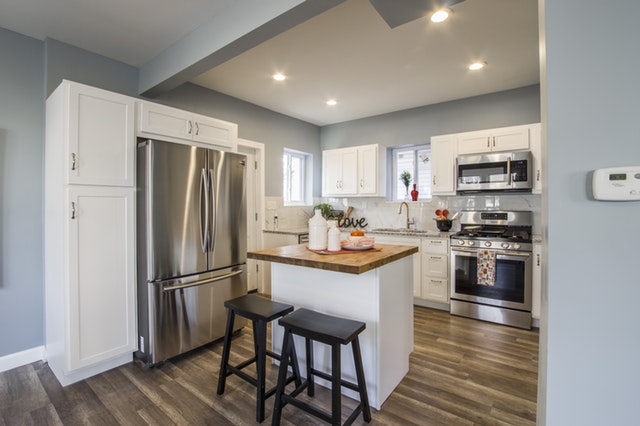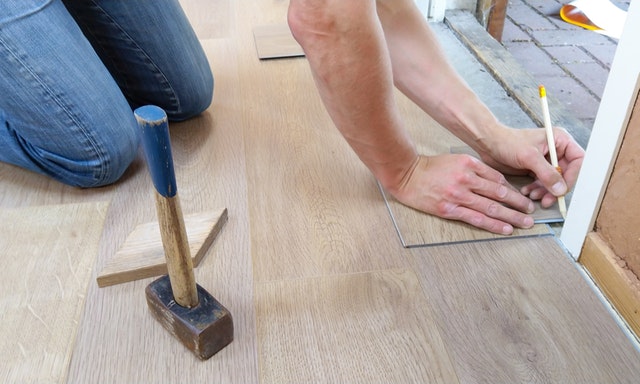 As a new homeowner, now is the time to take control and organize your house for safety and security. The following first five steps should be carried out in the first few weeks if possible.
As a new homeowner, now is the time to take control and organize your house for safety and security. The following first five steps should be carried out in the first few weeks if possible.
1. Change The Locks
There’s no way of knowing if the previous owners gave copies of the house keys to a friend, neighbor or cleaning staff. The very first thing you should do when you take ownership is to re-key the locks on all the doors, including the garage and any outbuildings there may be on the property.
Alternatively, you can install brand new locks. Either way, a locksmith can take care of this for you.
2. Locate Shut-Off Valves
Don’t wait until a water leak to run around searching for the main shut-off valve. Instead, take a few minutes to locate all the shut-off valves for your new home. Write down their locations and post the list next to your circuit breaker.
3. Label The Circuit Breaker Switches
As the new homeowner, you’ll want to know what each circuit breaker switch controls. Work with a family member to methodically go through and flip each switch off and on to figure out the controls. Then carefully label each switch so you never have to guess again.
4. Place Fire Extinguishers
Be ready for a small fire emergency by placing fire extinguishers in each room of your new home. For the kitchen and garage especially, be sure to purchase the correct type of fire extinguisher. The labels on the extinguishers will guide your decision. Even bedrooms could have at least a small extinguisher handy, in case of an electrical malfunction.
5. Survey The Land
It pays to walk the land around your property to visually survey it. You’ll want to know about potential issues, such as poison ivy growth or a broken fence panel. You might also find some happy surprises like a hidden rosebush or a nest of birds.
Taking the time to do these five steps will assist in making your new home more enjoyable for your family. They will also help you to familiarize yourself better with your new property.
Your trusted real estate agent will be there to assist you from beginning to end of your homebuying experience. Be sure to contact this valuable resource as soon as you are ready to start your search.
 During its post-meeting statement, the Federal Open Market Committee of the Federal Reserve announced that its target range for the Fed’s key interest rate would increase one quarter percent to 2.25 to 2.50 percent. While this rate hike was not expected by the Executive branch, it met analyst expectations.
During its post-meeting statement, the Federal Open Market Committee of the Federal Reserve announced that its target range for the Fed’s key interest rate would increase one quarter percent to 2.25 to 2.50 percent. While this rate hike was not expected by the Executive branch, it met analyst expectations. Your real estate agent can be the difference between a successful home buy and a bad purchase. Take a look at the characteristics of a good real estate agent and how you should vet your next partner in real estate.
Your real estate agent can be the difference between a successful home buy and a bad purchase. Take a look at the characteristics of a good real estate agent and how you should vet your next partner in real estate. Choosing a neighborhood you live in is almost as important as the house you buy. The right neighborhood can make your house feel even more like a home. But how do you find the right neighborhood to shop for your next home?
Choosing a neighborhood you live in is almost as important as the house you buy. The right neighborhood can make your house feel even more like a home. But how do you find the right neighborhood to shop for your next home? Virtual reality, artificial intelligence and drone video are just a few of the ways that technology is changing the real estate industry. If you are in the market for a property, understanding these new processes can help you in many ways.
Virtual reality, artificial intelligence and drone video are just a few of the ways that technology is changing the real estate industry. If you are in the market for a property, understanding these new processes can help you in many ways. You have about five minutes to impress (or not) prospective buyers at a showing. For curb appeal, you get about five seconds for buyers to decide whether they want to go inside.
You have about five minutes to impress (or not) prospective buyers at a showing. For curb appeal, you get about five seconds for buyers to decide whether they want to go inside. There’s a lot to be said for buying a move-in ready home. All you have to do is put your things away and start living your life. On the other hand, buying a fixer upper has its advantages, too. You can get a great bargain on a fixer upper home. So which one should you choose?
There’s a lot to be said for buying a move-in ready home. All you have to do is put your things away and start living your life. On the other hand, buying a fixer upper has its advantages, too. You can get a great bargain on a fixer upper home. So which one should you choose? Divorce can be an incredibly emotional and financially stressful time. Questions about what happens to assets and the family home add to the anxiety. Each state has divorce laws that differ and that can complicates decision-making.
Divorce can be an incredibly emotional and financially stressful time. Questions about what happens to assets and the family home add to the anxiety. Each state has divorce laws that differ and that can complicates decision-making. If you have pet, you probably wonder what you can do to keep them safe after you decide to put your home up for sale. With all the disruption going on during a home sale, it’s all too easy for pets to get lost, frightened or even injured. Learn how to keep your beloved pets safe during your home sale.
If you have pet, you probably wonder what you can do to keep them safe after you decide to put your home up for sale. With all the disruption going on during a home sale, it’s all too easy for pets to get lost, frightened or even injured. Learn how to keep your beloved pets safe during your home sale. There are several things to do when you prepare to list your home for sale. One of the projects you’ll need to do is complete certain repairs. Your home should be in the best possible condition before your real estate agent shows it to potential buyers.
There are several things to do when you prepare to list your home for sale. One of the projects you’ll need to do is complete certain repairs. Your home should be in the best possible condition before your real estate agent shows it to potential buyers.